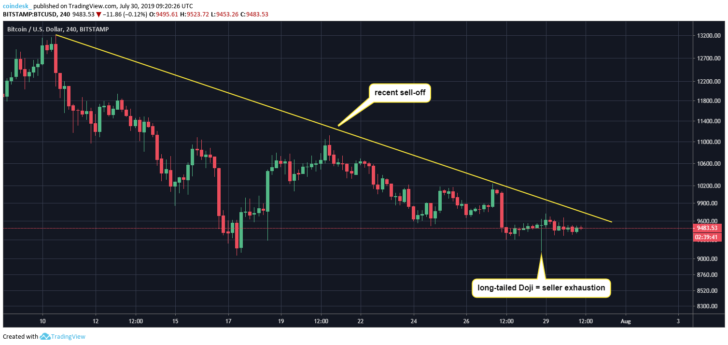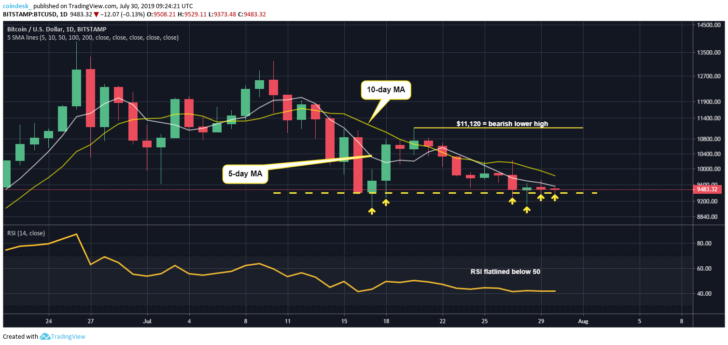View
- Bitcoin’s three-day chart is reporting a golden cross, a long-term bull market indicator, for the first time since February 2016. A similar crossover seen six months ahead of the August 2016 mining reward halving paved way for a mega bull run.
- History may repeat itself with mining reward halving due in less than 12 months.
- BTC may rise back to $10,000 in the next 24 hours or so with short duration charts signaling seller exhaustion.
- A UTC close above $11,120 is needed to revive the bullish view. On the downside, key support is seen at $9,049 (July 17 low).
Bitcoin’s (BTC) bulls have reason to be optimistic despite the recent 33 percent price drop, as a long-term technical indicator has turned bullish.
The 50-candle price average has crossed above the 200-candle average on the three-day chart, confirming a golden cross – a bull market indicator. That is the first such crossover on the three-day chart since Feb. 3, 2016, according to Bitstamp data.
That long-term moving average crossovers are lagging indicators and have limited predictive powers at best is widely known. So, seasoned traders may consider the latest cross as a product of BTC’s rally from December’s low of $3,122 to June’s high of $13,880. After all, MAs follow price and, the longer the time-frame of the MA, the bigger the lag.
Even so, the bulls can take heart from the golden cross, which has proved its mettle as a reliable indicator in the past, as discussed earlier this month.
Golden crosses 2016 and 2019
Bitcoin witnessed a golden cross in the three days to Feb. 3, 2016 – six months ahead of the mining reward halving – following which the cryptocurrency charted its way to a record high of $20,000 by December 2017.
With another reward halving (effectively, a supply cut) due in less than 12 months, history may just repeat itself.
As of writing , BTC is changing hands at $9,500 on Bitstamp, down 31.55 percent from June’s high of $13,880. The cryptocurrency could rise to $10,000 in the next 24 hours, according to the short-duration technical charts.
4-hour chart
The long-tailed doji seen on the 4-hour chart reflects the fact that sellers failed to keep prices at lows near $9,100 on July 28, with buyers pushing prices all the way back to $9,500.
The candle widely considered a sign of seller exhaustion, more so since it has appeared following a more than 30-percent decline from June’s high of $13,880.
Daily chart
A bearish lower-highs pattern, as represented by the falling trendline, is intact. The 5- and 10-day moving averages (MAs) are also trending south.
The 14-day relative strength index is reporting bearish conditions with a below-50 print. The indicator, however, is now flatlining, indicating a weakening of bearish momentum.
More importantly, dips to or below $9,400 have been consistently short-lived since July 16, also a sign of seller exhaustion.
As a result, a rise back to $10,000 in the next 24 hours cannot be ruled out. That said, a bull revival would require a UTC close above the bearish lower high of $11,120 created on July 20.
Disclosure: The author holds no cryptocurrency assets at the time of writing.
Bitcoin image via Shutterstock; charts by Trading View






